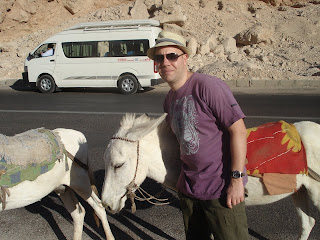
 After the mixed bag of Cairo, the Sage was grateful to swap Egypt's madcap metropolis for the far more laid back Luxor and Aswan. First however, there was the small matter of a 12 hour overnight train journey, which certainly tried the Sage's not inconsiderable patience to the limit.
After the mixed bag of Cairo, the Sage was grateful to swap Egypt's madcap metropolis for the far more laid back Luxor and Aswan. First however, there was the small matter of a 12 hour overnight train journey, which certainly tried the Sage's not inconsiderable patience to the limit.Egyptian trains are not exactly the Orient Express. The carriages are old, tatty and oblige travellers to become closely acquainted with the local cockroaches. The toilets resemble the one Ewan McGregor dives into in Trainspotting, and before even answering nature's call you have to cough and splutter your way through the fug of cigarette smoke emitted by the hordes of fellow passengers lighting up in the corridors. Attempting to sleep was largely futile, especially for the Sage who was sat across the aisle from a fanatical-looking man who insisted on chanting extracts from the Koran to himself until 3am. Each glance of disapproval from the Western infidel was met with a steely gaze of disdain, so I decided discretion was the better part of valour in order to avoid being brutally decapitated the moment I shut my eyes.
At around 10am I emerged bleary-eyed into the Luxor sunshine - their winter maybe, but still over 30 degrees. Luxor, formerly known as Thebes, is a fascinating place. The capital of Egypt's New Kingdom in the second millenium BC, it's basically a huge open air museum with a host of wonderfully preserved ancient sites including Karnak temple and the Valley Of The Kings. After managing to stay awake long enough to enjoy a tour of Karnak, I hit the hotel rooftop pool and got chatting to a charming Swiss lady who informed me that Naomi Campbell was getting married in one of Luxor's temples the following week. Since returning to England I have read the wedding was cancelled due to details leaking out to the press. I can confirm The Sage had nothing whatsoever to do with this unfortunate breach of confidence.
After another day in Luxor, which saw the Sage successfully navigate a donkey from the banks of the Nile to the Valley Of The Kings without being dismounted, it was on to Aswan. Like Luxor, this is positively chilled out compared to Cairo, and is also arguably the place where the Arab world starts to merge into Africa proper. For the first time, you start to see black faces in the streets, members of the Nubian tribes that live all across southern Egypt and northern Sudan. From Aswan, I was able to visit the spectacular temple of Abu Simbel, a kind of Egyptian Mount Rushmore hewn from a rock face in 1300 B.C and then taken apart and rebuilt 100 metres away from it's original location in the 1960s to preserve it during the construction of the Aswan dam. Very seldom does a man-made structure take the breath away, but Abu Simbel is truly sensational - an Indiana Jones style fantasy temple which even the hordes of tourists scurrying beneath it like ants cannot totally divest of its atmosphere.
In order to visit Abu Simbel, you have to obtain government permission to join one of two police guided convoys that set off there in the early hours of each morning. By this stage of my trip, the police presence came as no surprise - in Egypt, they are literally everywhere. Outside historical sites, on the door of every hotel, at stations, on trains, on the streets - it's impossible to escape these heavily armed symbols of a highly authoritarian state.
While the threat of terrorist atrocities against tourists remains very real following a series of attacks in the past 10-15 years, this need for security does not excuse harassment, bribery and intimidation. Officers on duty at the pyramids try and extort money to take photos, I had my suitcase randomly searched at one hotel, and our guide was apprehended for carrying a bag that was supposedly 'a brand that could only be owned by police.' These kind of actions hardly make them a 21st century Gestapo, but it does leave something of a sour taste, adding to my overall impression that Egypt is a country where the present day is considerably less glorious than the past. Several Egyptians I spoke to long for a better society in their homeland, with free elections, greater civil liberties and higher standards of living, but few expect their situation to significantly improve in the foreseeable future.
As I sit at my desk here in Stockwell, I'm thinking that perhaps I've been too harsh on Egypt. Poverty, overcrowding, pollution, corruption, repression, street hawking - these are all inescapable elements of most developing nations, and governments across the globe face a struggle to address and overcome them. But the Sage believes in telling it like it is, and for all it's magnificent historical legacy as the world's first nation state and the home of one of the most captivating of ancient civilisations, what we see today is a country that frustrates more than it inspires.
No comments:
Post a Comment